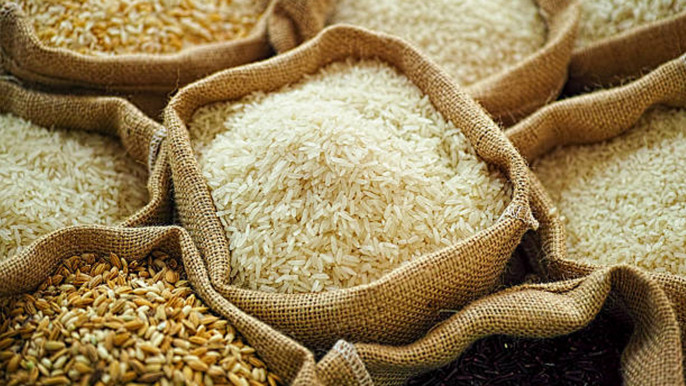Tags
Govt to import 10.50 lakh tonnes of rice
Abul Kashem & Shaikh Abdullah
Food Secretary Md Masudul Hasan told TBS that by December, at least 2 lakh tonnes of rice will be imported through the private sector and another 3 lakh tonnes through G2G agreements.

- 5 lakh tonnes of rice to be imported by December
- 2 lakh tonnes through private sector
- 3 lakh tonnes through G2G agreements
- Licences were issued to 134 traders
- But LCs for only 9,500 tonnes of rice opened so far
The government is set to import 10.50 lakh tonnes of rice this fiscal year to stabilise domestic rice prices and maintain a sufficient food reserve, with the Ministry of Food aiming to bring in 50% of that amount by December.
Ministry officials say rice will be imported from Vietnam and Myanmar through government-to-government (G2G) deals. Additionally, the government has initiated open tender processes to import rice from India.
Food Secretary Md Masudul Hasan told TBS that by December, at least 2 lakh tonnes of rice will be imported through the private sector and another 3 lakh tonnes through G2G agreements.
According to officials, rice prices have recently increased in the local market. Despite the arrival of the Aman season, rice prices are rising. Government food reserves are also depleting. To address this, the government has removed all import duties and taxes to boost supply and ensure adequate reserves.
However, these measures have yet to impact market prices as traders have shown little interest in importing.
Md Masudul Hasan said today (14 November) at a press briefing at Khaddo Bhaban that licences were issued to 134 traders to import 10.52 lakh tonnes of rice for the private sector.
However, LCs for only 9,500 tonnes of rice have been opened so far, and most of the rice corresponding to these LCs has already arrived in the country, he said.
Officials say the Tariff Commission on 29 October highlighted the rising rice prices in the global market and recommended the removal of 62% import duties to the National Board of Revenue (NBR).
In response, on 31 October, a notification from the Ministry of Finance’s Internal Resources Division removed all duties on the import of boiled and Atap rice. Following this, the food ministry set a deadline of 14 November for private-sector rice imports.
Food Adviser Ali Imam Majumder said at the press briefing that rice prices are high in the international market. As a result, the government is negotiating with neighbouring countries, including Myanmar, requesting them to reduce the price of rice.
Bangladesh has agreements with Vietnam and Myanmar regarding rice imports, reached by the previous administration. Although a similar agreement was reached with India, that deal has since expired.
Ali Imam said rice production has been affected by floods in regions such as Feni and Noakhali, as well as several other places. Initially, the Ministry of Agriculture had predicted a reduction of 10 lakh tonnes in production but later revised it to an estimated 6-7 lakh tonnes.
“The agriculture department has reported good paddy yields in the northern region. If production remains strong, we may be in a better position,” he said.
He also mentioned that production costs have increased. To ensure that farmers receive a fair price, the government has raised the procurement price of paddy. From next Sunday, paddy procurement will begin in the northern region.
He added that while the food reserve may not be in a very comfortable zone, efforts are being made to increase reserves by quickly starting the procurement of Aman paddy and rice.
Rice prices rising in the market
According to Trading Corporation of Bangladesh (TCB) data on 13 November, the price of coarse rice varieties like Swarna and China has increased by 4.90% over the past year. On Wednesday, these varieties were selling for Tk52 to Tk55 per kg in various markets across Dhaka.
Meanwhile, the price of medium-grade rice, such as Paijam, has risen by 14.81%. On Wednesday, this variety was selling at Tk59 to Tk65 per kg in Dhaka’s markets. Since most people in the country consume these types of rice, any increase in their prices significantly raises overall food expenses.
Additionally, the price of finer rice varieties, like Nazirshail, has increased by 8.03%.
According to data from the Ministry of Food, as of 12 November, the government’s food grain stock stood at around 12.97 lakh tonnes. This includes over 8.54 lakh tonnes of rice, 1,335 tonnes of paddy (calculated in terms of rice), and 4.41 lakh tonnes of wheat. On 31 October, the total stock was 13.8 lakh tonnes.
Sources at the Directorate General of Food indicate that the government does not consider the current stock to be adequate, given the volume of rice and flour distributed through various programmes, such as Open Market Sales (OMS) and the Vulnerable Group Feeding (VGF).
Until 31 October this year, the government has distributed 10.44 lakh tonnes of foodgrains and aims to maintain this distribution pace.
According to the minutes of the Food Planning and Monitoring Committee meeting held on 6 November, the net rice requirement in the public sector for this fiscal year is 20.52 lakh tonnes. During the last Boro season, the government collected 12.56 lakh tonnes of rice and 2.97 lakh tonnes of paddy.
In FY24, the country produced 4.07 crore tonnes of rice and 12 lakh tonnes of wheat. For the current FY25, the Ministry of Agriculture has set a production target of 4.30 crore tonnes of rice and 12.14 lakh tonnes of wheat, according to the meeting.
Data from the Directorate General of Food show that as of 11 November in FY25, no rice has been imported by either the government or the private sector, while 18.54 lakh tonnes of wheat have been imported.
Published Date: November 15, 2024






